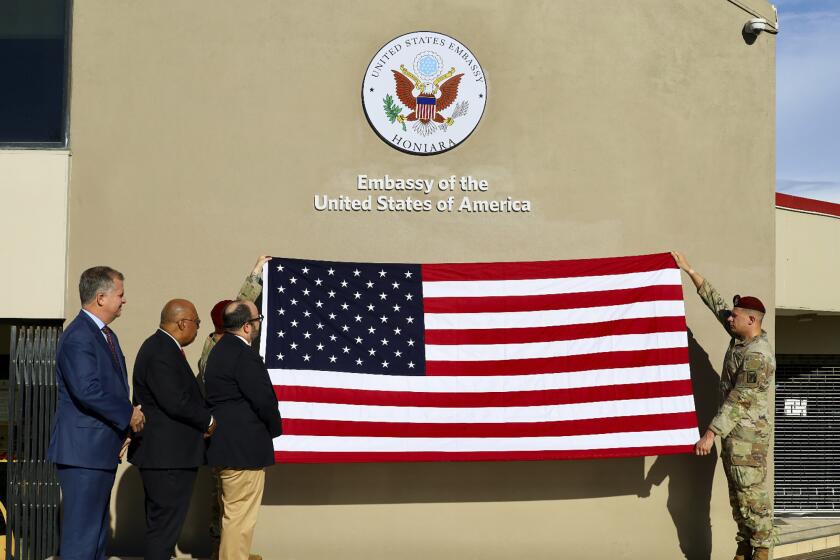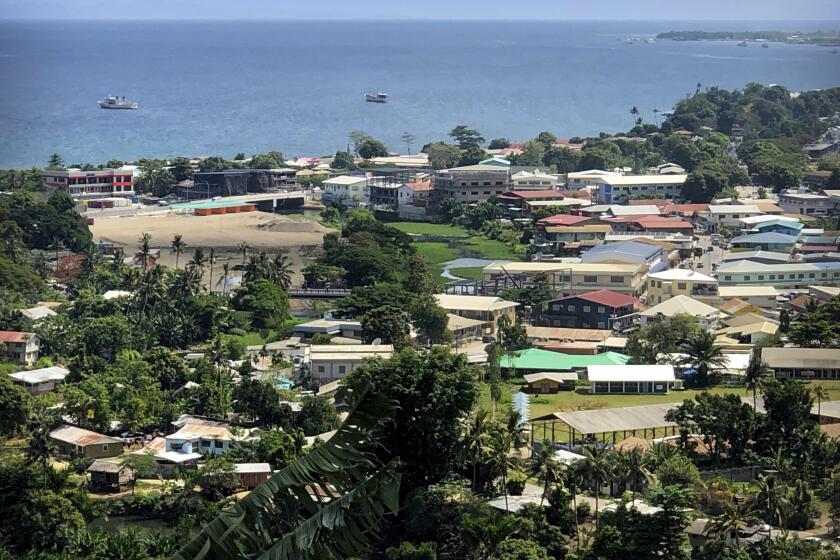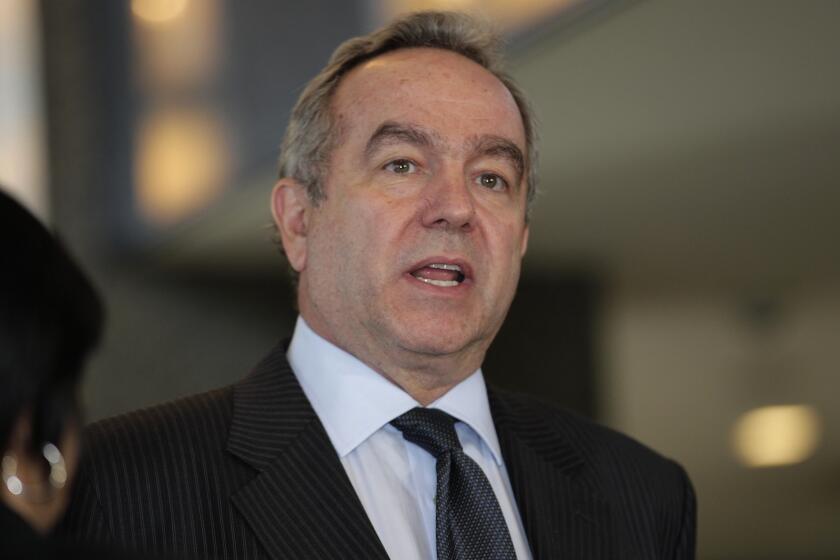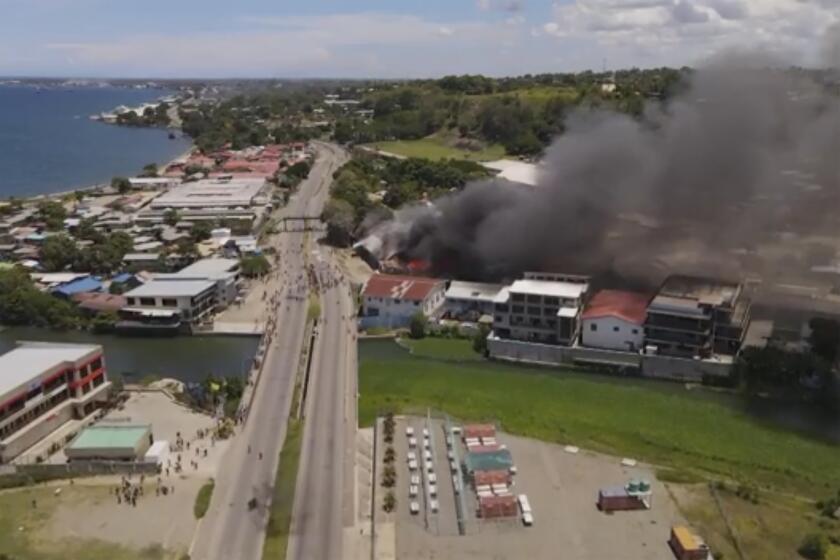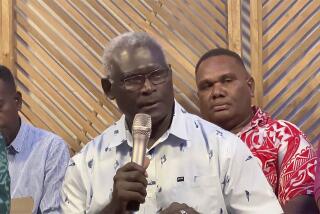Solomon Islanders cast votes in an election that will shape relations with China
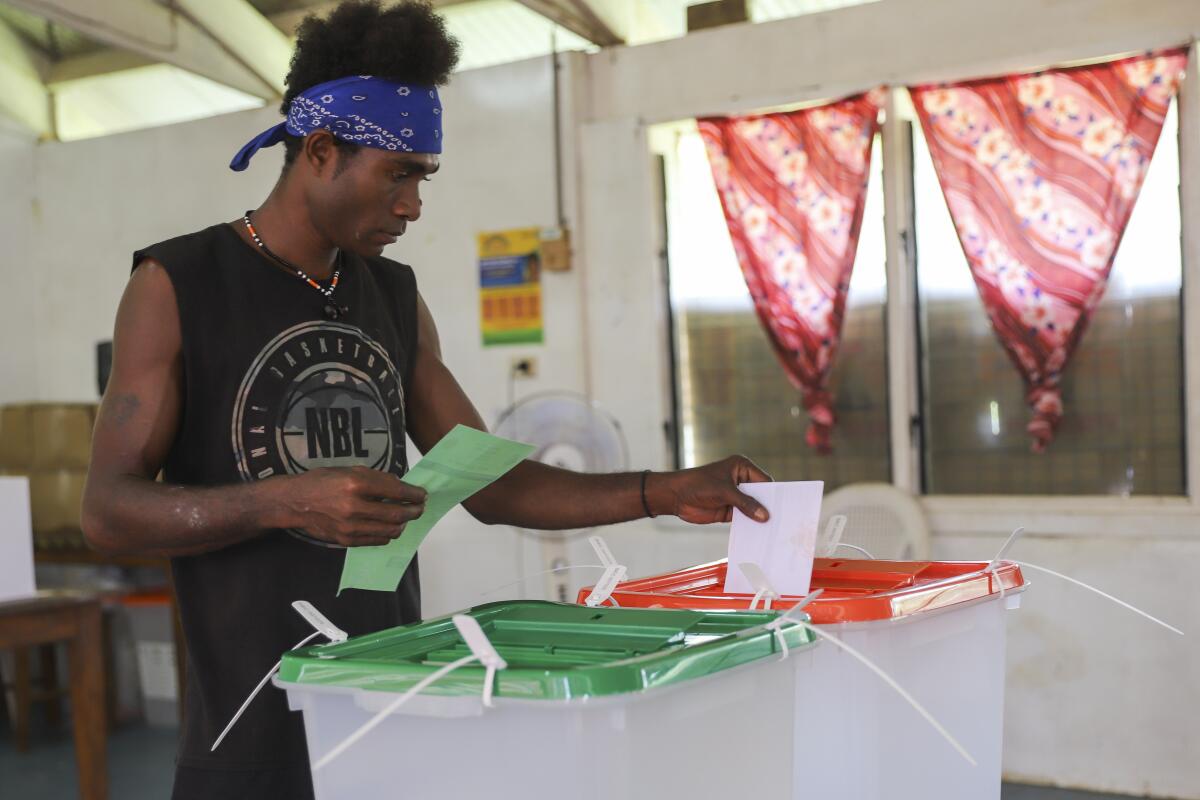
- Share via
HONIARA, Solomon Islands — Voting has closed across Solomon Islands on Wednesday in the South Pacific nation’s first general election since the government switched diplomatic allegiances from Taiwan to Beijing and struck a secret security pact that has raised fears of the Chinese navy gaining a foothold in the region.
The Solomon Islands’ closer relationship with China and a troubled domestic economy weighed on voters’ minds as they cast their ballots.
As many as 420,000 registered voters had their say across 50 national seats on Wednesday.
For the first time, the national vote also coincides with elections for eight of the 10 local governments.
Esther Maeluma cast her vote in the National Art Gallery in the capital Honiara and said it seemed busier than the last national election in 2019.
In its latest move to counter China’s push into the Pacific, the United States has reopened an embassy in the Solomon Islands after a 30-year absence.
“I want my country and the economy to be good, and that’s why I chose my candidate,” she said outside a polling station.
Some voters queued outside polling stations from 4 a.m. — three hours before polling began — with many more flocking to booths early after seeing the growing crowds. Voting ended at 4 p.m.
With early voting available to a select few, voters have spent recent days traveling back to home electorates, quietening the streets of Honiara and forcing the nation’s main hospital to enter crisis mode due to a lack of staff.
“I didn’t used to vote, but now I can see that maybe my vote can change the system and the country,” hospital worker Loretta Maeohu said.
The United States has been working to build diplomatic bridges with South Pacific island nations since Prime Minister Manasseh Sogavare signed the security pact with China.
The Solomon Islands’ diplomatic break from Taiwan is but one cause of the many troubles and ethnic divisions within the South Pacific archipelago.
Russia’s Sputnik news agency last week published an article featuring anonymous claims that the United States was planning an “electoral coup” in the Solomon Islands, which were repeated in an article published by the Chinese Communist Party’s Global Times newspaper. Links to the articles have been posted on social media.
U.S. Ambassador to the Solomons, Papua New Guinea, and Vanuatu, Ann Marie Yastishock on Tuesday released a statement dismissing “blatantly misleading claims about the United States’ engagement in the region.”
“We strongly refute allegations being made in known propaganda outlets that claim USAID and the U.S. government has sought to influence the upcoming election in Solomon Islands,” Yastishock said.
More than 1,000 polling stations were scattered across villages and town centers across the Solomons archipelago, 1,200 miles off Australia’s northeast coast. Some were visited by Sogavare, who is well regarded for his political acumen but criticized for backsliding on democracy. He has asked voters to back his economic plans against a backdrop of closer ties with China.
The Biden administration has warned the Solomon Islands that the United States will take unspecified action against the South Pacific nation should its recently concluded cooperation agreement with China pose a threat to U.S. or allied interests.
Since he became prime minister at the 2019 election, which is his fourth and longest stint in the top office, he has been criticized for switching diplomatic ties from Taiwan without parliamentary approval.
Sogavare points to China’s gift of a $100-million sporting complex used to host regional Pacific Games last year and a similarly sized loan to build a national broadband network led by Chinese tech giant Huawei as examples of why the switch from Taiwan, a democratic island that Beijing claims as China’s territory, was the correct move for the developing country.
Opposition candidates have campaigned on re-examining elements of the Chinese relationship including the 2022 security pact with Beijing.
Domestic issues, including health clinics running low on medicines and the rising cost of living, have also played key roles in the campaigns.
Loyalties to candidates through blood or church can also influence ballots, while the illegal practice of vote-buying also occurs.
Police have warned they are prepared to quickly respond to any potential repeat of politically motivated disorder that has broken out after past elections.
An anti-government riot devastated Honiara in late 2021 after Sogavare’s leadership survived a no-confidence motion in parliament, denting the national economy by an estimated 6.5%.
Solomon Islands Prime Minister Manasseh Sogavare has blamed foreign interference for anti-government protests, arson and vandalism that have ravaged the capital in recent days.
“National and provincial politics can be very volatile,” Solomons historian, professor emeritus Clive Moore said on Tuesday. “The police need to handle the situation carefully.”
Australia has provided $16 million in election assistance including logistical support to get polling stations and ballots to extremely remote areas.
Sogavare says Australia remains his government’s preferred security partner despite the contentious security pact with Beijing.
More than 430 Australian military and police personnel are also on the ground to assist with logistics and security, as requested by Solomons authorities. Smaller security contingents from New Zealand, Papua New Guinea and Fiji were also on hand to maintain order.
Vote counting begins Thursday. But the result will not be known for more than a week.
More to Read
Sign up for Essential California
The most important California stories and recommendations in your inbox every morning.
You may occasionally receive promotional content from the Los Angeles Times.
